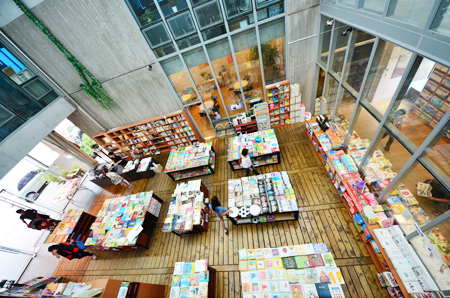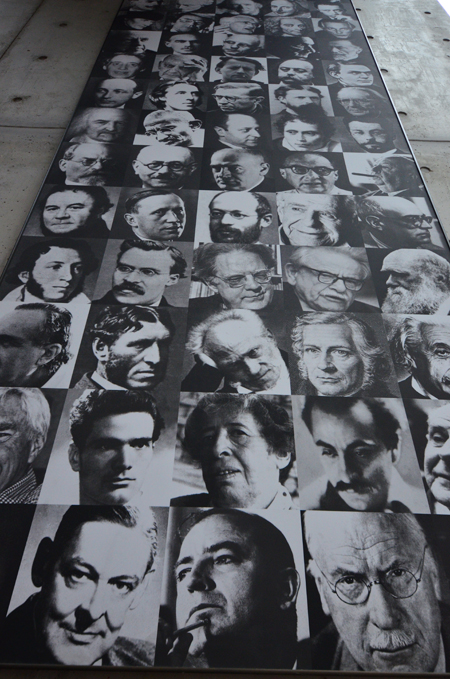
Nature, music, book at Paju BookSori 2012

Books, nature and music intermingle in this celebration to delight readers, authors and publishers in Paju, the Asian capital of books.
Located 30 kilometers north of Seoul, Paju in Gyeonggi Province has recently emerged as the nation’s new center of art and culture with events like the DMZ Korean International Documentary Festival and Heyri Art Valley.
Since the establishment of Paju Book City in 2005, it has become Korea’s publishing capital. For those who have yet to visit the city, there is no better time than the coming month to get a glimpse of Asia’s only one-stop cluster of the publishing industry.
The upcoming Paju BookSori festival is a great reason to visit. It will be held from Sept. 15-23.
“In the festival’s inaugural year in 2011, it was received with enthusiasm from visitors here and abroad. We had about 300,000 visitors,” Lee Ki-joo, media director of the festival said. “This year, the festival will have more than 200 publishers and 300 cultural organizations are participating from within and outside Korea.”
The programs include meetings with authors, book readings, performances, exhibitions, workshops and seminars.
It also features a lecture series with 30 guest authors. Visitors are also allowed to visit printing shops and publishers in the complex to observe the book-making process. A collection of ancient documents will be on display as well.
“For book lovers, we will organize a book market, where people can buy books at discount prices. There will be books from Europe and Japan that have not been previously available here,” Lee added.
Highlights of the festival include activities to mark some of Korea’s greatest scholars and writers.
Those recognized include Jeong Yak-yong (17621836, styled Dasan), a leading Korean philosopher from the late Joseon Kingdom. He is known as the author of “Mongmin Simso,” which was translated into English for the first time and published by the University of California Press under the title “Admonitions on Governing the People” in 2010. It is considered a must-read, particularly for politicians and government officials. The work is encyclopedic in its range and depth, providing insight not only about administrative matters but also about crucial aspects of the history and culture shared by East Asian countries such as Korea, China and Japan.

This year marks the 250 anniversary of his birth. There will be a seminar on the legacy of his work as well as a concert that features songs from his poems.
There will be a tribute also for poet Kim So-wol (19021934) to mark the 110th anniversary of his birth.
A special exhibition of Korean magazines since the Japanese occupation will be prepared by the National Museum of Korea and a symposium of the world’s book towns from Belgium, Norway, Australia, Malaysia and Japan.
Combined with great scenery and restaurants, Paju Book City is the perfect getaway for weekenders any time of the year as one of the most successful models in the nation. The culture community exclusively plans, produces and distributes books with some 260 publication companies.
To get to Paju Book City on public transportation, take buses 9000, 2200, or 200 from Dangsan Station or Hapjeong Station on subway line two. The bus will take you through the city center and along the riverside road running north of the Han River. The 30-minute bus ride ends at Paju Book City and the entrance is marked by six red steel pillars with a plaque bearing the city’s name. Beyond the entrance is a wide avenue with buildings standing on both sides of the street.
What catches the eyes of visitors is the modern and stylish design of the buildings, the creations of leading architects from Korea and abroad.
Paju Book City was conceived 22 years ago but only completed in 2005. In the early days, it was criticized for poor accessibility from Seoul and other major cities, but six years on most of the publishing companies doing business in the complex have expressed a high level of satisfaction. In addition to publishing companies, the Paju Book City houses printers, book-binders, and cover design companies.
Date: Sept. 15 ~ 23
Features: A lecture series on literature by 30 famous Korean writers; experience publishing and printing works, themed book markets, book readings, crossover performances.
Venue: Paju Book City
Organizer: Paju City, Paju BookSori Organizing Committee
<The Korea Times/Do Je-hae>


